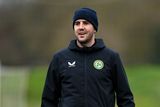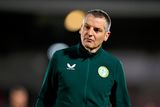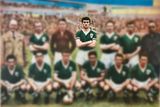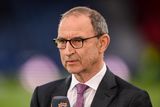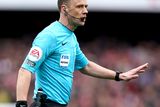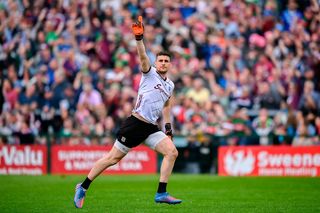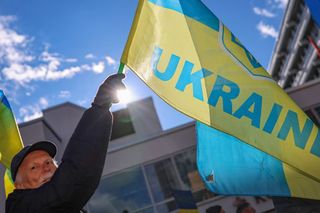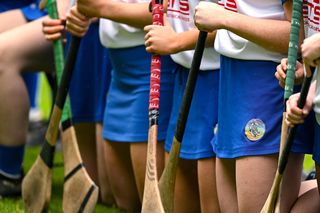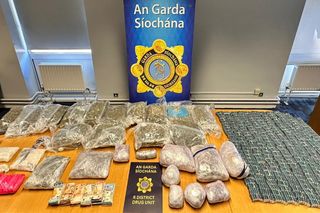Declaring for Ireland, THAT goal and life after death - Ireland legend Alan McLoughlin in his own words
Alan McLoughlin celebrates in Windsor Park in 1993
Former Ireland international Alan McLoughlin has died after a battle with cancer at the age of 54.
In 2014, his book, A Different Shade Of Green, was published by Ballpoint Press, as McLoughlin reflected on his life and career.
Here are some reflections from Alan McLoughlin in his own words.
On his Irish heritage
The fact is that both my parents are Irish-born. I didn't qualify under the much-maligned 'granny rule'. I didn't need to. When my parents came to England they were both escaping an Ireland of insularity and unemployment. If it hadn't been for economic and familial circumstances, I would have been Irish-born.
Whenever I needed to justify my right to play for Ireland, all I had to do was look to mum and dad. Mum is from Knockaderry in County Limerick, dad is from Largan, between Headford and Tuam, on the Galway/Mayo border.
On declaring for Ireland
I could have played for England because I was born in Manchester but instead I chose Ireland. I got the call-up for both. Aged 22, I got home to my house one day and there, on top of a pile of mail, was a pristine envelope with the Three Lions on it. I had been selected to play for England B. I called mum, she was delighted with the news. Then I turned to the pile of mail sitting on the doormat. One slightly dog-eared brown envelope, from the FAI. I had been selected for Ireland B too. I phoned mum up again. This time, I heard a little crack of emotion in her voice as she told me how proud she was. Although she was trying to hide it, she was a lot more excited. This was the woman who had regularly cycled across Manchester in the rain to watch me play school matches as a kid. And that was it for me. Ireland.
On Manchester United release
I played over 40 games for United's reserves but there were too many established players ahead of me. After three years with United, Big Ron let me go, in May 1986. Aberdeen manager Alex Ferguson was waiting in the wings, and I suppose I was of little concern to Big Ron as he struggled with bigger problems. Letting young Alan McLoughlin go was no big deal. For me, it was devastating.
On getting Ireland's call in 1990
Maurice Setters, Jack Charlton's assistant, was on the end of the line, offering me his hearty congratulations that I would be travelling to the World Cup finals with Ireland. I greeted the news by telling him to 'f*** off' before slamming the handset down. I was sure I was the victim of latest prank by my Swindon Town team-mates. I knew the squad had been announced and I wasn't in it. There was no way I was going to to be the butt of jokes. Maurice called me again, not in the best of moods. "Listen to me son, if you ever do that again you'll be watching the World Cup at home, not playing in it. Your flight's on Tuesday morning at 10am. The tickets are waiting for you at the airport".
On World Cup exit to Italy
The referee gave us nothing, we lost to a Toto Schillaci goal. And that was that. Jack shook everyone's hand afterwards and told us he was proud of us. I made my way into the Italian changing room and found Gianluca Vialli. I asked him for something of his and offered him an Adidas/Opel tshirt, which was pretty shite. He took off his Diadora jersey and gave it to me, I still treasure it.
On partying at USA 94
My wife was missing me a lot. I was back at the hotel but had been invited out for a drink by Larry Mullen. Deby asked me what my plans were, and not wanting to upset her I told her I was tired and was having a quiet night in. After telling her I loved her I scurried out for pints with Larry Mullen, who had sent a limo to collect me. But in a stroke of bad luck, a British camera crew was at the hotel to cover the aftermath of the win over the Italians. As I stepped into Larry's party limo, a couple of tins of Budweiser in my hand, I was caught on camera. She gave me both barrels but I deserved it.
On death threats before England game in 1995
Pompey's Jamaican international Paul Hall and I were both English-born but playing for foreign countries, a letter to the club proclaimed. Simply signed 'Combat 18', it warned me to expect trouble on account of my 'treachery'. The club reported the threat to the police, who took it seriously. Soon, two Special Branch men were at my house, instructing me carefully on how to check my vehicle for a car bomb, a ritual I performed diligently every morning for a few months before deciding that I couldn't live my life in fear of Combat 18 and their bigoted threats.
On his second coming with Ireland under Mick McCarthy
When Roy Keane suffered a knee injury I'd had to step up to prove myself. To prove I could do it in a midfield without Roy. To prove that I could steer the ship from midfield in a team undergoing personnel changes. To be a rock for Mick as he worked with younger players. And I did, confirmation when I was named as player of the year in 1996. That award is a source of great pride for me.
On the end of his Ireland career in 1999
Travelling home after the Macedonia game I knew that was that. After amassing 42 caps I knew the end was nigh. I felt numb on the way home and when I got home, the upset hit me. I cried with disappointment, a realisation that my time with Ireland was just about up, added to the feelings of failure to qualify for Euro 2000. I knew my international career was at an end.
On the FAI
I was surprised at the FAI. In 2007, aged 40, I underwent a hip replacement, testament to the fact that for 20 years I had put my body on the line for club and country, particularly the latter. I had always dutifully turned out for the Republic, I was there for those exhausting, eye-reddening foreign trips, put up with corner-cutting and poor hotels and never kicked up a fuss. How many corporate junkets were carved out of my left foot volley in 1993? I'd done the state some service. Did the FAI put in a courtesy call when I was at my lowest ebb? No they didn't.
On his cancer diagnosis
After the diagnosis, the last thing I wanted was sympathy. I wanted to fight, not wallow in other people's condolences.
On life after death
I occasionally get out the video of that goal against Northern Ireland, watch my volley and watch the elation on my face. I think back to touching down at Dublin airport as the hero of the hour. I think back over my life and career. Serious illness brings with it the inevitable thought of standing at the pearly gates, and accounting for your life. I think back on the characters I've come across, the family members that I have loved and cherished, the joy and pain, I think back to Big Jack telling the cameras that, with the goal, I had justified my existence. And I reflect with a wry smile that, yes, when all is said and done, I had done exactly that.
From A Different Shade Of Green, by Alan McLoughlin, Ballpoint Press, 2014.



